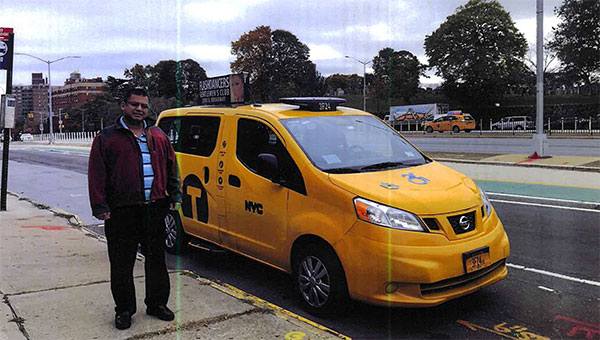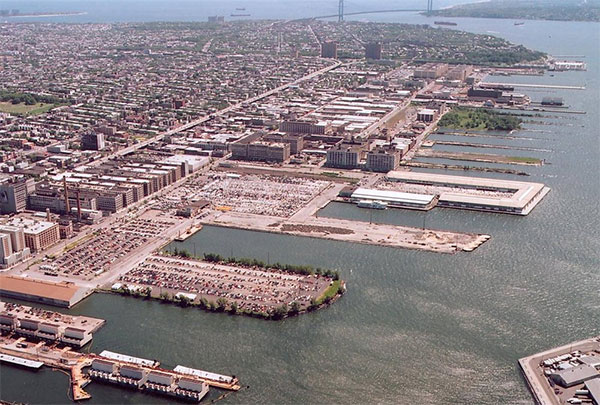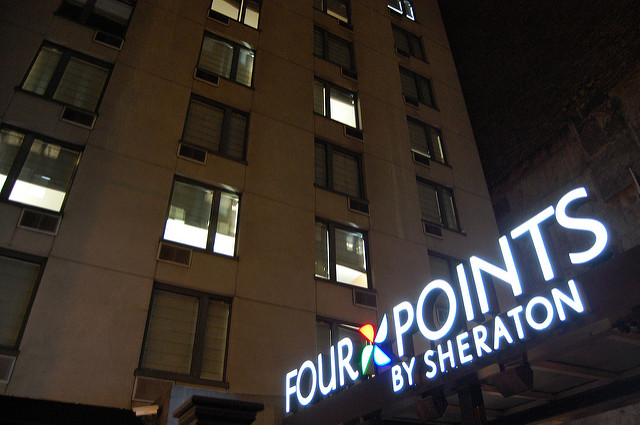Don’t Let Congestion Pricing Push Accessible Taxis Off the Road

Masud Chowdhury, the author
As a longtime yellow taxi driver, I was proud to be among the first to drive one of the city’s wheelchair-accessible taxis, which are equipped to serve New Yorkers with disabilities. There are now around 2,000 accessible yellow taxis in New York City as the industry continues striving to become 50 percent accessible by 2020.
But it might be impossible for taxi drivers like me to keep our accessible vehicles on the road if we are hit with high fees under a congestion pricing system designed to raise funds for mass transit repairs. While the concept of congestion pricing is a good thing and more money must be generated for our subway system, the fact is that it would be unfair to target yellow taxis under such a program.
The problem here is that state officials are in the process of considering potential congestion pricing plans that would treat taxis in the same way as app-based ride-hailing companies like Uber and Lyft. Although that might sound fair, in reality it is not fair at all.
Yellow taxis have already contributed hundreds of millions of dollars to our subways and mass transit infrastructure, as well as providing an important source of accessible transportation. Uber and Lyft, both multi-billion-dollar companies, have done neither of these things – and any congestion pricing plan must hold these companies accountable without harming hardworking taxi drivers who are already doing the right thing.
New Yorkers must remember that, since 2009, yellow taxis have been paying a 50-cent fee to the MTA on every single ride, generating significant revenue for mass transit. Uber and Lyft have refused to follow suit and instead pay sales tax, which does not provide nearly as much support to the subway system. In fact, MTA officials have acknowledged in the past that the rapid growth of app-based companies has deprived the state of funding that could have gone to support mass transit infrastructure.
At the same time, while cabbies like me have put a great deal of effort into driving accessible taxis that are much costlier and more difficult to maintain, Uber and Lyft have done nothing to put their own accessible cars on the road. We are already bearing a heavy burden to provide this important service to thousands of wheelchair users – and these billionaire companies are not.
And let’s be real – we all know these companies have been the much bigger driver of added congestion in New York City. Since 2013, the number of vehicles for Uber, Lyft and other similar companies has nearly doubled from 47,000 to more than 100,000 in 2017, while the yellow taxi industry remains capped at roughly 13,500 medallions.
When you look at all the facts, there is simply no reason for state officials to even consider a congestion pricing plan that would treat taxi drivers like me the same as companies like Uber and Lyft. It wouldn’t just be unfair – it could make it even harder to keep costly accessible taxis on the road, and that would be a problem not just for me but for so many New Yorkers with disabilities.
On behalf of other drivers feeling the same concerns, I sincerely hope that Governor Cuomo and the state Legislature will keep these important issues in mind and develop a congestion pricing framework that is fair to everyone on the road – including yellow taxis.
***
Masud Chowdhury drives a wheelchair accessible taxi. A yellow taxi driver for more than 20 years, he lives with his family in Ozone Park, Queens.
***
Have an op-ed idea or submission for Gotham Gazette? Email This email address is being protected from spambots. You need JavaScript enabled to view it.
Offshore Wind, Onshore Justice

the Sunset Park waterfront
In New York City, we have learned from hard experience that our energy, environmental, and economic systems are highly interrelated. Decades of underinvestment in low-income communities of color – particularly from the loss of blue-collar industries -- compounds the profound vulnerability of these neighborhoods to climate change.
Beyond New York, 2017 saw ten consecutive Atlantic hurricanes, a historical first: Irma was the strongest storm to reach beyond the Caribbean; Harvey brought the greatest rainfall; and months after Maria wrought unprecedented devastation, half of Puerto Rico is still in the dark. For both the Global South and South Brooklyn, the time for incremental solutions has passed. We need an immediate and just transition towards a regenerative economy.
At UPROSE, a community-based organization in Sunset Park that advocates for sustainable economic development and environmental justice, our advocacy for climate justice is rooted in our struggles against displacement—displacement by rising waters and rising costs of living. The Climate Justice Alliance is a national collaborative of over 50 community-based and support organizations working to forge a scalable, and socio-economically just transition away from an extractive economy and towards local living economies.
Together, we are calling for the creation of new offshore wind manufacturing and logistics jobs on New York City’s waterfront to strengthen neighborhood resilience and make the case against re-zonings that irreversibly impair our capacity to address climate change locally.
Sunset Park is home to one of the city’s last working waterfronts and is today the target of rampant commercial speculation. Offshore wind energy can address the neighborhood’s vulnerabilities by saving maritime industrial sites, displacing dirty fossil-fuel plants that disproportionately affect people of color, and creating thousands of local jobs. The Department of Energy expects 40,000 such jobs by 2030 – and those opportunities will accrue wherever the ports and workforce are.
Positioning New York City at the center of this industry would localize supply chains and capture jobs for a fast-growing regional market. By 2020, our waterfront could see the first wave of opportunities: welding and turbine final assembly jobs, all under the banner of organized labor. Significant benefits to ancillary businesses could prioritize M/WBEs and lift local economies.
To advance this vision, Mayor de Blasio can take three actions.
First, the City can leverage its purchasing power to catalyze offshore wind construction. Second, the City can prioritize offshore wind uses at its waterfront industrial sites. Third, it can partner with local groups like UPROSE, labor, industry, and CUNY to ensure community members have the necessary skills to work in the industry. These actions will bring to the city reliable, locally-sourced clean energy and new career pathways for working waterfront neighborhoods.
The history of New York City was written at the water’s edge. How we leverage our waterfront at this inflection point will define our era’s response to the dual crises of growing climate disruption and mounting inequality. The City is today presented with a clear and decisive opportunity to act boldly and demonstrate its commitment to economic, environmental, racial, and climate justice. Anything short of this would be throwing dust to the wind.
***
Elizabeth Yeampierre is Executive Director of UPROSE, an environmental justice community-based organization in Sunset Park. She was the first Latina Chair of the US EPA National Environmental Justice Advisory Council and currently serves on Mayor de Blasio’s Sustainability Advisory Board.
Angela Adrar currently serves as the Executive Director of the Climate Justice Alliance, a 55+ member coalition of urban and rural frontline communities and organizations in the climate change movement. She has served as a leading member of local and international groups dedicated to food and environmental justice.
***
Have an op-ed idea or submission for Gotham Gazette? Email This email address is being protected from spambots. You need JavaScript enabled to view it.
Want to Fix High Rent? Look to Hotels, Not Hardworking Home-Sharers

(photo: Andrew Russeth via Flickr)
If you’ve lived in New York City anytime in the last half-century, one thing is as certain as the sun will rise: the rent is just too damn high.
Now, in recent weeks, defenders of the hotel industry would have you believe that this is some new phenomena to be entirely blamed on hardworking home-sharers. How dare they!
I don’t buy it, and neither should you. This is all just part of the hotel industry lobby’s smear campaign, funded by big corporate hotels, like Trump Hotels in New York City. Let’s walk through their mudslinging playbook one step at a time and then talk about the truth.
Step one: Cite a “report” authored by a Canadian researcher and based on unreliable data and offensive racial profiling of hosts -- and most importantly, paid for by the hotel industry lobby -- and pass it off as serious academic research. Falsely claim that New Yorkers sharing their homes are responsible for gentrification.
Step two: Demonize New Yorkers sharing their home so that they can afford to start a business, pay their bills -- and even combat those rising rent prices and stay in their home. Accuse these law-abiding people of gaming the system and operating in secret, and falsely claim that they are the single reason rents are increasing. And go for the shock and awe effect: compare them to President Trump (who, by the way, is a famous hotelier, for anyone looking to make accurate connections).
Step three: Erroneously claim that Airbnb doesn’t share data about listings, hosts, and impact on the local economy. Paint Airbnb and home-sharers as a faceless, opaque, corporate special interest.
Check, check, and check for the hotel lobby.
Over the years, I’ve become skeptical of any front group that will stop at no end to deliberately demonize people and cast blame. It’s a page right out of the Trump playbook - under the chapter titled, “Fake News.”
Because in the case of home-sharing, the truth - the real truth - tells a different story.
The truth is that increasing costs of rent, property taxes, and utilities are resulting in some New Yorkers, particularly in communities of color whose families have lived in their neighborhoods for generations, being pushed out of their homes.
The truth is that, for these New Yorkers under increasing pressure to make ends meet, home-sharing platforms like Airbnb have been a tool of economic empowerment, especially in communities of color. It helps New Yorkers pay for that unexpected doctor’s bill, afford their taxes, fund a new business - and in the case of Airbnb, it’s even helped 79 percent of hosts to stay in their homes. The cost of living is not going down, but in the case of these New Yorkers, home-sharing has ensured that it doesn’t overtake them and their families.
The truth is that home-sharing has helped New Yorkers take control of their economic future. With tourism booming, these new tools have helped expand economic opportunity to New Yorkers, not just hotel owners and others who have traditionally held the wealth and the power in our city.
But here’s the most important truth: if any one party is to shoulder the blame for the declining affordability of our city, it’s the hotel industry that has that dubious honor.
A recent report by the Internet Association found that hotel development (not home sharing) cost the city affordable housing. This report looked at public data, showing that between 2010 and 2016 hotel development “resulted in the loss of more than 750,000 square feet of pre existing residential space and 773 pre existing residential units.”
The hotel industry is all too willing to cast home sharing New Yorkers as the culprits of the affordable housing crisis. But it’s clear that is just a diversion - because when it comes to their big, brand-spanking-new hotel developments, they aren’t putting their money where their mouth is. Consider this truth bomb dropped in that same report:
“If just half of the total new hotel space had been used for residential purposes and 20% of that space was dedicated to affordable housing, more than 2.9 million square feet of market-rate housing and over 727,000 square feet of affordable housing could have been created. That is the equivalent of 3,878 market-rate and 969 affordable one-bedroom units, assuming an average unit size of 750 square feet.”
Next time the hotel industry blames New Yorkers for the affordable housing crisis, ask its representatives how many residential buildings will be converted into housing for visitors. Ask them what new hotel developments will include affordable housing. Ask them why they aren’t partnering with advocacy groups or the city to build new affordable housing. And most importantly, ask why the hotel industry is prosecuting ordinary New Yorkers just trying to make ends meet.
***
Rev. Dr. Johnnie M. Green Jr. ios Senior Pastor, Mount Neboh Baptist Church and President of MPAC.
***
Have an op-ed idea or submission for Gotham Gazette? Email This email address is being protected from spambots. You need JavaScript enabled to view it.




